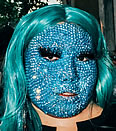
of Service to Asia's
Gay & Lesbian Community!
| Covid Recovery Discount: to help build your business back up, we are offering a 50% or higher discount off 12 months on any of our promotions ! |
|
| |||||||||||||||||||||||||||||||||||||||
| AIDS/HIV News Archive: SINGAPORE
Singapore may test couples for HIV before marriage 5/12/04 -- Reuters Couples in Singapore may face mandatory HIV tests before marrying, Singapore media reported on Sunday, a week after the government said all pregnant women would be screened for HIV/AIDS to stem a rise in new infections. Health Minister Khaw Boon Wan said Singapore planned to seek public feedback on the pre-marital HIV tests in the wealthy, tightly controlled city-state, where the number of new HIV infections reached a record high this year. "If you ask me as a parent, I think there is no harm. I have three girls and you do not know what their boyfriends will be like," Khaw was quoted by The Straits Times as telling local reporters on Saturday. "I think we are more likely to succeed if we treat this as a purely public health problem, so let's take away the morality and religion from all this," he said. Khaw said Singapore was at the beginning of a second wave in the development of HIV, where more women are becoming infected. Singapore media reports have recently focused on the problem of men visiting prostitutes while travelling in Asia. The number of new infections are already at a record high this year with 257 cases reported in the first 10 months of 2004, topping the 242 new cases reported for all of 2003. Health officials say Singapore, a tiny island of 4.2 million people, could face 1,000 new cases a year by 2010 according to current trends. To date, Singapore has recorded a total of 2,332 HIV infections, of whom 874 have died. Activists say AIDS awareness efforts are undermined in Singapore by antiquated laws that make gay sex illegal between men.
HIV/AIDS Infection Rises in Singapore 24/11/03 -- Agence France Press Singapore's HIV infection rate is up, with 201 people diagnosed in the first 10 months of this year, compared to 189 for the same period last year, the government said today. In a statement, the Ministry of Health said 198 of the 201 new cases were infected via sexual transmission, 78 percent of which were heterosexual transmissions. About 88 percent of the new cases were males. "Among those who acquired the infection through the sexual route, about 88 percent had sexual exposure to prostitutes (locally and overseas) and/or casual sex partners," said the MOH. "The Ministry would like to emphasize that the only way to avoid AIDS is to remain faithful to one's spouse and to avoid casual sex and sex with prostitutes. Persons who engage in casual sex or sex with prostitutes are advised to lower their risk by wearing condoms," it said. A total of 2,034 Singaporeans have been infected with HIV/AIDS since the city-state's first cases were detected in 1985.
Singapore to Give Out Condoms to Male Travelers 23/12/02 -- AIDS Weekly Singapore plans to distribute HIV prevention packs containing condoms to male travelers heading to what it deems high-risk destinations, the Straits Times reported. The Health Promotion Board will distribute the packs, which will also contain information on the dangers of casual sex, through local travel agents. The plan was announced at the third annual Singapore AIDS conference. Homosexual acts are illegal in Singapore, and AIDS is seldom discussed. Over 200 people in Singapore are infected with HIV every year, with the majority contracting the virus from casual sex or sex with prostitutes, the paper said. The target demographic for the program will be blue-collar workers, because more than half of all HIV-positive Singaporeans work in blue-collar jobs, according to Minister of State for Health Balaji Sadasivan. Singapore, a tightly controlled Southeast Asian city-state of 4 million people, has 1,788 HIV cases, with men ages 20 to 59 making up 90 percent of the cases.
Singapore Uses Shocking Images to Turn Students Off Sex 11/12/02 -- Associated Press Singapore announced a new strategy to put teens off casual sex. In January, the government's Health Promotion Board will distribute a booklet to 15-year-olds featuring color photographs of people infected with, and disfigured by, gonorrhea, chlamydia, and syphilis. The booklet is a departure from the norm in a country with routine censorship. "It's very graphic, we want to grab their attention and bring across the dangers," said Leona Lo, a Board spokesperson. Teens and parents who saw the images described the booklet as shocking. "The pictures are gross," said student Ben Tay. "But the scarier the better because it's the fear factor that will stop people." Singapore reports one of the lowest STD transmission rates in the world, with a total of 6,500 cases reported last year.
Singapore Teens Offered Sex Education over Their Mobile Phones 08/10/02 -- Associated Press A Singaporean doctor known for his wireless ovulation alert services launched a new ten-day sex education campaign Tuesday offering free advice for teenagers via mobile phone text messaging. During the "Sex in the Air" campaign, teens can send text questions through their mobile phones, and doctors from Singapore, Amsterdam and Melbourne will respond within two days, said organizer Dr. Wei Siang Yu. Text messaging - a little-used feature of mobile phones in some countries like the United States - is hugely popular in Singapore, which boasts the highest rate of mobile phone use in the world. Wei said he hopes Singapore teens will use the text messaging service to ask questions about sensitive or embarrassing topics such as safe sex, AIDS, pregnancy and masturbation. In May, Wei launched Megg Alert, whose monthly text messages remind subscribers they may be premenstrual or ovulating. Pornography and homosexual acts are illegal in this conservative Southeast Asian city-state, and steamy scenes are frequently edited out of imported TV shows and films. However, according to the Singaporean group Action for AIDS, HIV is just as prevalent in Singapore - a wealthy, highly modernized country of 4 million - as in other developed nations, with more than 1,500 registered HIV cases at the end of last year. "It's difficult for children to ask parents about sex," said Dr. Peter Lim, a urologist and member of the Singapore Planned Parenthood Association, one of three private organizations supporting "Sex in the Air." "The campaign provides answers by sex and fertility doctors while allowing teenagers to remain anonymous," he said. The other groups supporting the campaign are Action for AIDS and Singapore Youth Challenge.
Singaporeans Call for AIDS-Drug Subsidies 5/19/02 -- Associated Press AIDS activists at a candlelight vigil in Singapore Sunday called for the government of this wealthy island nation to subsidize AIDS drugs. Unlike many other developed nations, Singapore does not offer a state subsidy for the drugs, which are too expensive for many Singaporeans, according to Action for AIDS, the group that arranged the vigil. "It's both sad and unfortunate that we are unable to provide affordable care for our own patients," Roy Chan, the group's president, told the crowd of about 150 who gathered to mark the International AIDS Candlelight Memorial Day, held yearly since 1983. Singapore argues that prevention and education should be the focus, since the drugs do not cure the disease. At the end of last year, 1,599 Singaporeans were infected with HIV, according to government figures.
New cases of HIV infection reported in 2000 22/11/00 -- Singapore Ministry of Health In the first ten months of 2000, another 189 Singaporeans were detected to be HIV infected. About 86% of the new cases detected this year were males and 14% were females. Sexual transmission remains the main mode of HIV infection among Singaporeans. Of the 189 cases reported this year, almost 97% acquired the infection through the sexual route with heterosexual transmission accounting for 86% of infections, homosexual transmission 5% and bisexual transmission 6%. The remaining 3% were due to intravenous drug use (2%) and perinatal transmission (1%). Among those who acquired the infection through the sexual route, about 83% had sexual exposure to prostitutes (locally and overseas) and/or casual sex partners. Those aged between 30 to 49 years of age accounted for about 65% of all new cases reported this year. Those aged between 20 to 29 years and 50 to 59 years each accounted for about 13% of new cases this year. Half of the new cases were single while about 35% were married, 11% were divorced and 4% were widowed.
HIV Virus Tearing Through Singapore 25/2/98 -- Nando Times Online According to the Singapore Ministry of Health, HIV infections in the country rose 24 percent in 1997, with a total of 731 infections recorded by the end of December. The ministry said that 173 new HIV infections were reported last year, 34 more than in 1996. The overwhelming majority of the infections were contracted through heterosexual sex--primarily casual sex and sex with prostitutes in Singapore and overseas, the ministry noted.
SINGAPORE: Aids awareness suffers under the veil of secrecy Oct 9, 1997 .SOMEWHERE in the Health Ministry, there must be someone who knows the answers to questions about Aids in Singapore. What we do receive from the ministry is a regular update stating the cold numbers of new HIV infections, with breakdowns by age, gender and sexual orientation. That, plus the ministry's standard advice that the only way to avoid Aids is to stay faithful to your spouse and avoid casual sex or sex with prostitutes. Twelve years after Singapore discovered its first Aids patient, it is plain that the calls to faithfulness and abstinence fall on deaf ears, as much today as through the ages. Meanwhile, the number of new HIV infections here keeps going up, from two in 1985 to 17 in 1990 to 111 in 1995 to 139 last year. And in the first half of this year, there were 73 new cases of HIV infection. The secrecy over much that concerns Aids here, and the paltry information that is released, combine to keep HIV infections and Aids shrouded in mystery and too set apart from the reality of most people's lives. Is it any wonder then if too many people imagine that Aids will not happen to them? The heavy secrecy which continues to cloak Aids in Singapore tells us we must speak in whispers. And as long as we do that, we are more likely to recoil when those we know fall sick. A greater openness with the facts is needed to allow people to accept Aids as a disease of our times, a fact of life and death, to deal with plainly, humanely. -- by Alan John, STRAITS TIMES
Singapore reports new AIDS figures
Oct 8, 1996
As of June, a total of 477 Singaporeans had been found to be infected
with the Human Immunodeficiency Virus, which causes Aids. Of these, 76 have full blown Aids and 155 have died. Between April and June, 34 Singaporeans were found to be infected
with the HIV virus. All 34 had acquired the infection through sexual
means.
-- STRAITS TIMES
AIDS EPIDEMIC LOOMS OVER BOOMING ASEAN ECONOMIES
Oct 8, 1996
An AIDS epidemic threatens the robust economies of Southeast Asia, with increasing trade, travel and migrant labour fuelling its spread, disease control specialists from ASEAN countries said .
"We in ASEAN are located in the area of the world predicted to become the centre of the AIDS pandemic," Chen Ai Ju, director of medical services in Singapore's Health Ministry, said opening a three-day meeting of the ASEAN task force on AIDS.
Singapore has 308 registered carriers but only 303 people are said to be infected in Indonesia, the region's most populous country with nearly 200 million people. The Philippines has 800 people infected. Health activists believe the numbers, especially in Indonesia and the Philippines, are grossly under-reported.
ASEAN comprises Brunei, Indonesia, Malaysia, the Philippines, Singapore, Thailand and Vietnam.
--Copyright 1996 Nando.net |

|
Phnom Pehn's gay men-only boutique hotel, spa, pool and restaurant... |

|
QUNCI VILLAS, a gay-friendly, gay-managed tropical resort on the heavenly island of Lombak, just next to Bali... |

|
At Bangkok Pride (photo: Amp Puttipong) |

|
At Bangkok Pride (photo: Siam Pride) |

|
At Bangkok Pride (photo: Siam Pride) |

|
At Bangkok Pride (photo: Siam Pride) |

|
At Tokyo Rainbow Pride |

|
Dynamic duo at Cambodia Pride |

|
Special photo exhibition by Mark Leighton! |
HOTELS IN ASIA + UTOPIA MEMBER DISCOUNTS + GALLERY AIDS/HIV INFO + ASIAN NEWS ARCHIVE + SAFER SEX + TRAVEL TIPS ADVERTISE + ABOUT UTOPIA + EMAIL US
Australia
+ Bhutan
+ Cambodia
+ China (including Hong Kong, Macau, Tibet)
+ East Timor
+ India
+ Indonesia
+ Japan + Korea
+ Laos All original text, images and content (c) 1994-2026. Utopia is a Registered Trademark. 乌同邦 |
